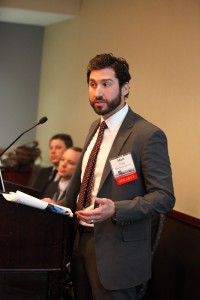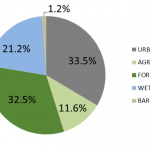New Jersey Future Blog
Forum Feature: Does Green Infrastructure Create Real Estate Value?
March 20th, 2014 by Steve Nelson
As the real estate market stages a slow but steady comeback from the Great Recession, and as commercial property owners consider new investments and re-investments in buildings and land, the use of green infrastructure (rain gardens, bioswales, permeable pavement, additional trees and planted roofs) is increasingly being considered. But does all this green infrastructure create additional real estate value?
This question was discussed in a session at this year’s Redevelopment Forum by panelists representing real estate developers, local government and non-profits. As moderator Sen. Robert Smith (D-17th Legislative District) noted at the outset, “There is an opportunity for better ideas,” and the three panelists offered several examples of how green infrastructure is indeed a better idea.
A report recently produced by the Natural Resources Defense Council (NRDC) provided compelling evidence that investment in green infrastructure does add measurable value to commercial properties. The newly released study, The Green Edge: How Commercial Property Investment in Green Infrastructure Creates Value, took three prototype commercial developments – a small office building, a small retail center and a four-story multi-family project – and analyzed how green infrastructure can be financially beneficial to real estate investors. The NRDC reviewed over 100 studies that quantified financial benefits of various types of green infrastructure as part of their work. By using life-cycle costs, NRDC’s study concludes that a 53,000-square-foot office building using green infrastructure can generate approximately $2 million in benefits over a 40-year period, through reduced roof costs (green roofs need to be replaced less often), increased rents, decreased energy costs, anticipated tax credits, and reduced stormwater fees; a 40,000-square-foot retail development can generate about $24 million in benefits (mostly from increased consumer spending due to the aesthetic appeal of such locations) over this same time period; and a four-story multi-family building can generate about $1.7 million in benefits. (All figures are present-value figures.)
A commercial property developer in Hoboken, Bijou Properties provides “real-life” data that supports the NRDC study. In three recently completed developments in Hoboken, Bijou has seen reduced life-cycle costs, increased rental rates, increased property values, decreased building energy costs, reduced HVAC and hot water capital costs and reduced water bills. Matt Testa of Bijou also commented that the biggest benefit was asset stability; i.e., longer tenant leases and increased tenant care of the buildings. He did note that the strong real estate market in Hoboken allowed Bijou to add items such as a green roof, and that a weaker market may not support such investments. One other lesson that he offered was the need for any green-infrastructure considerations to occur very early in the design process. Decisions on these design elements cannot be delayed, he said.
Finally, Damon Rich, planning director for the City of Newark, gave several examples of how the city is providing green infrastructure in the form of parks and open space, and thus attracting private investment near these places. In a city with combined storm sewers and sanitary sewers, over 70 percent impervious cover and a deficit of tree cover, Newark sees its role as providing some of the pre-development work for developers by creating additional green public spaces.
As to what New Jersey can do, the speakers agreed that the state could provide more incentives, regulatory reform and technical assistance to make the inclusion of green infrastructure more common in redevelopment projects.

















